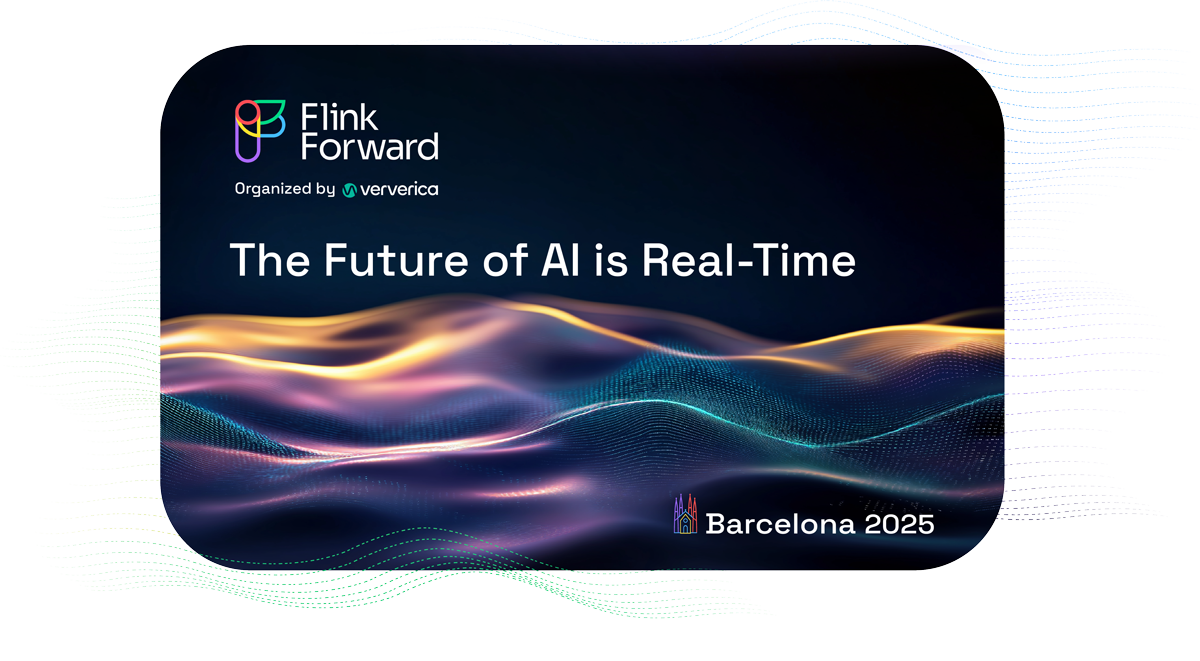This year, Flink Forward Barcelona 2025 offers a four day conference schedule.
The first two days are dedicated to optional in-person, expert-led training courses. At the conclusion of training, the main conference includes two additional days packed with exciting content, including sessions selected by the Program Committee from the streaming data community.
Flink Forward Barcelona 2025 is sure to provide a vibrant social environment, including plenty of opportunities to network with expert speakers, other attendees and partners in the engaging expo hall. In celebration, at the conclusion of Flink Forward Barcelona, join the community at Flink Fest, the closing party you won’t want to miss.
Agenda
Trainers

With a background primarily in engineering leadership and entrepreneurship, Ben has extensive experience building and managing engineering teams across various sectors, including logistics, gaming, and mobile applications. His expertise lies in developing solutions centered around real-world interactions, particularly in areas such as GPS-based technologies, augmented reality, and multi-user collaboration.
Outside of his professional life, Ben is an avid technology enthusiast. He enjoys playing and creating video games and trading cards. Ben balances his career with family life, being a father to two young children and a caretaker to three pet ducks.

Morning
Afternoon
Evening
Day 1
Monday, Oct 13
Training
Training
Day 2
Tuesday, Oct 14
Training
Training
Speakers Dinner
Day 3
Wednesday, Oct 15
Keynote sessions
Conference
Sponsors Cocktail
Day 4
Thursday, Oct 16
Conference
Conference
Flink Fest
Bootcamp Program
The Ververica Bootcamp Program is an intensive initiative that transforms Apache Flink users into proficient data processing professionals. By translating complex Flink concepts into practical exercises rooted in real-world scenarios, we empower participants to tackle their toughest data challenges. Leveraging Ververica technology, participants gain a deep understanding of Flink and learn to optimize the scalability and efficiency of our solutions. This program is not just about learning; it’s about mastering Apache Flink and leading the future of data processing.
Level Up Your Stream Processing Skills
This intensive, 2-day face-to-face program is designed for Apache Flink users with 1-2 years of experience who want to take their skills to the intermediate level. We'll delve into advanced Flink concepts and techniques, empowering you to build and deploy highly scalable and efficient real-time data processing pipelines. Leveraging Ververica technology, you'll gain a deeper understanding of Flink and explore best practices for production deployments.
Target Audience
Apache Flink users with a minimum of 1-2 years of experience who are comfortable with core concepts and want to become proficient in advanced functionalities.
Key Topics
- Advanced Windowing Operations
- Time Management Strategies
- State Management Techniques
- Serialization Optimization
- Exactly-Once Processing
- Fault Tolerance
- Enrichment Techniques
- Scalability Optimization
- Flink SQL Functions
- Table API Features
- Workflow Design
- Using Paimon Effectively
Master Advanced Windowing Operations in Apache Flink:
- Understand and implement session windows, tumbling/sliding windows with triggers, and time management strategies (Event Time, Processing Time, Ingestion Time).
Optimize State Management for High Performance in Flink Applications:
- Apply advanced state management techniques including state partitioning and RocksDB integration.
- Optimize state size and access patterns for enhanced performance.
Improve Workflow Performance via Advanced Serialization Techniques:
- Learn how to reduce time spent serializing and deserializing data, for data sources and sinks (connectors), and over the network.
Deep Dive into Exactly-Once Processing and Failure Recovery:
- Understand the differences between at-least-once, exactly-once, and exactly-once end-to-end. Learn how to effectively use exactly-once processing when faced with bad data, infrastructure failures, and workflow bugs.
Develop Complex Real-Time Pipelines:
- Build a workflow that processes a continuous stream of events to generate both dashboard and analytics results.
- Learn how best to enrich data from a variety of data sources.
- Optimize complex workflows using pre-filtering, pruning, async I/O, broadcast streams, parallel partial enrichments, and other techniques.
Use Flink SQL & Table APIs to Implement Workflows:
- Utilize the advanced functionalities of Flink SQL, including UDFs and Table Functions, and master the Flink Table API for unified data transformations and real-time analytics.
- Compare and contrast the resulting workflow with the Java API.
Designing Optimized Workflows:
- Learn about situations where splitting a workflow into multiple components improves efficiency and reduces operational complexity.
- Learn how to use Paimon as an efficient and low-overhead data bridge between workflows.
Prerequisites
Programming Skills
- Intermediate Java experience
- Basic SQL knowledge
Apache Flink Experience
- Hands-on experience with Flink APIs
- Ability to deploy and manage Flink jobs
- Understanding of event time and state concepts
System Knowledge
- Stream processing fundamentals
- Distributed systems experience
- Basic cloud platform understanding
- ETL and data pipeline concepts
Workshop Program
Flink Ecosystem - Building Pipelines for Real-Time Data Lakes
This intensive, 2-day face-to-face program is designed for Apache Flink users with 1-2 years of experience who want to take their skills to the intermediate level. We'll delve into advanced Flink concepts and techniques, empowering you to build and deploy highly scalable and efficient real-time data processing pipelines. Leveraging Ververica technology, you'll gain a deeper understanding of Flink and explore best practices for production deployments.
Target Audience
Intermediate to Advanced; 1-2 years of experience working with data lakes, stream processing, or Apache Flink
Why this workshop?
Flink helps unlock the full potential of data lakes by providing the necessary stream and batch processing capabilities to transform raw data into actionable insights. This course will:
- Focus on the relationship between data lakes and how they are rooted in Flink's ability to process and analyze large-scale data that often resides in data lakes.
What will this workshop cover?
- Data Lakes as Sources: Easily integrate data from cost-effective distributed storage systems in varying open source formats like Paimon into your Flink pipelines.
- Flink for Real-time Processing: Utilize Data Lakes as the input of streaming and batch jobs.
- Real-time Data Ingestion: Automate all parts of your data processing pipeline with real-time data ingestion, enabling real-time decision making, model training, and inference.
- Long-Term Storage and Retrieval: Utilize Data Lakes for storage of intermediate processed results (e.g. feature engineering) with easy ingestion for downstream applications like retraining of machine learning models.
- Unified Data Processing: Flink provides a unified framework for both stream and batch processing, important for managing and processing data at scale in Data Lakes. Flink provides consistency across your entire data pipeline with the scale and optimizations only Flink can provide.
How the Flink ecosystem technologies fit into the workshop?
Flink CDC, Paimon and Fluss are all integral parts of the Flink ecosystem that allow us to integrate large scale Data Lakes with the real-time data processing of Flink. We use real-world use cases and hands-on exercises to demonstrate how Flink and Data Lakes work together seamlessly.
- Combine data from Data Lakes and Kafka sources to create real-time machine learning pipelines with both historical and real-time model training.
- Utilize Flink CDC and Flink SQL for automating data cleansing for real-time feature engineering in machine learning models. Retrieve raw data or store feature engineering results in Paimon for cost-effective, large-scale storage ready for real-time and batch processing.
- Fluss supports low-latency stream processing, ideal for storing and retrieving data with real-time analytics. Fluss enables high-performance event processing, making it easier to handle data that is continuously ingested and stored in a Data Lake.
- Power real-time pipelines using an optimized approach of CED (Complex Event Processing) and model inference backed by the scale and power of Flink.
